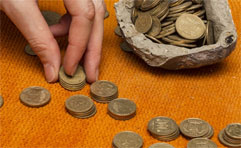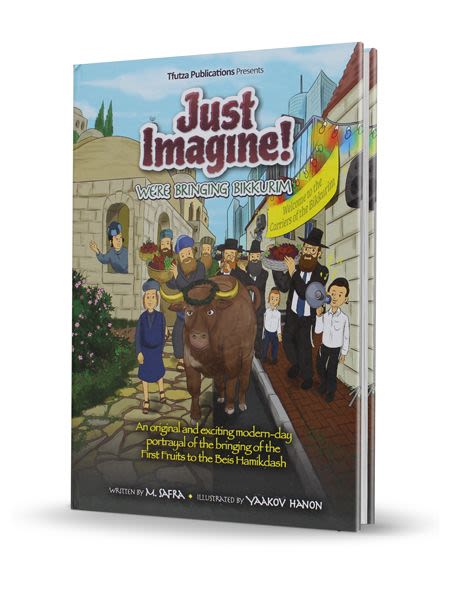
Small Change
Is change easy? Why are people so afraid of change? “I grew up a certain way and I am too set in my ways,” some feel. But, nothing could be further from the truth…

Change. Is change easy? Why are people so afraid of change? “I grew up a certain way and I am too set in my ways” some feel. Yet nothing could be further from the truth. Change is actually much easier than we think. What holds us back is that we falsely believe that we have to change all at once. The following story will help us better understand this fundamental principle.
The small Jewish Town of Kreplach was elated when a match was made between two poor orphans. The rabbis of the town took it upon themselves to raise all the funds necessary for their wedding and first years of marriage. The rabbis set their goal at 10,000 rubles. Young Rabbi Schwartz and two older colleagues decided to approach Mr. Kaplan, the local millionaire who was known as the town’s miser.
Rabbi Schwartz asked permission from the two senior rabbis to deal directly with the miser and they consented. When the butler led the three rabbis to the study of the grand mansion, Rabbi Schwartz began relating the heartbreaking tale of the two orphans to Mr. Kaplan. He related the difficult childhood they endured without parents. He described in detail their trials as children, having to go from home to home and work so hard from such an early age. He shared with Mr. Kaplan the feelings of joy now that they finally found each other, and their hope to build a beautiful Jewish home of their own . . . To their  surprise, the three rabbis found Mr. Kaplan crying, as he heard the touching tale of the two young orphans in distress. “I am really touched by this story and will take good care of the orphans” said Mr. Kaplan. “Please wait right here and I will be right back.” Mr. Kaplan then went down to his cellar where he kept his large safe. When he came back upstairs to meet his guests, he handed Rabbi Schwartz one copper kopek.
surprise, the three rabbis found Mr. Kaplan crying, as he heard the touching tale of the two young orphans in distress. “I am really touched by this story and will take good care of the orphans” said Mr. Kaplan. “Please wait right here and I will be right back.” Mr. Kaplan then went down to his cellar where he kept his large safe. When he came back upstairs to meet his guests, he handed Rabbi Schwartz one copper kopek.
“Thank you so much!” said Rabbi Schwartz sincerely, to the shock of the two accompanying rabbis. “May Hashem bless you and your home!” He told Mr. Kaplan.
“Wait” said Mr. Kaplan. “You know what? I really am truly touched by the story of these orphans and really want to take good care of them. Please wait right here and I will return momentarily.” Again, Mr. Kaplan went down to his cellar and this time returned with two copper kopeks.
“Wow!” said Rabbi Schwartz excitedly. “May Hashem shower you and your family double fold for your generosity! May all the blessings of the Torah come upon you and your wife and children.”
Then again, Mr. Kaplan spoke out, “I apologize for keeping you waiting, please I really want to help. Please wait one more time while I return with a large sum to help provide for our two poor orphans in their new life.” This time Mr. Kaplan returned with a silver coin.
“A silver coin!” exclaimed Rabbi Schwartz. “You are such a tzaddik! This is so generous and kind of you. We really can’t thank you enough.” This back and forth continued the entire day. Mr. Kaplan kept making his way down to his safe and Rabbi Schwartz kept thanking him sincerely and showering him with blessings. Each time Mr. Kaplan came back with more and more expensive coins.
By the end of that day, Mr. Kaplan donated the entire sum the rabbis hoped to raise to marry off the two orphans. “How did you do it?” Asked the two shocked rabbis of Rabbi Schwartz, as they finally left Mr. Kaplan’s mansion.
“It’s no secret.” replied Rabbi Schwartz. “All Jews are kindhearted and generous. Mr. Kaplan wanted so much to give, but every time someone came to him for charity and they only received one measly copper coin, they threw it back in his face. The act of giving would open up his heart to give more, but as long as that first coin was not accepted, his heart could not open up to giving more. As you saw, once he got past that first coin, his kind heart opened more and more and his ability to give grew larger and larger.”
The Evil Inclination tells us we can’t. He tells us it’s too difficult. When we actually make a small change the Evil Inclination tells us, “This is nothing. You call this change?!” In response, we often just give up. If we truly want to change, to come closer to Hashem, we must do so in small steps at first. If you want to pray with a minyan in the morning, but find it difficult to wake up early, chose a day in addition to Shabbat to pray with a minyan on time, and do your best to stick to that one other day. When you finally feel more comfortable add another day. This may take a month or two or even three, but with small steps you will find it easier and easier as you add on additional days.
A woman who wants to dress more modestly but finds it difficult can decide that when she lights Shabbat candles, she will light with a skirt. If she’s married, she may decide to only light candles with her hair covered. Stick to that. Then keep the skirt and hair covering for the Friday night meal. Once you are comfortable, do it for the entire Shabbat and eventually add a weekday. If a Jew really wants to start keeping Shabbat, but finds it difficult to begin, he should invite friends for Shabbat Friday night dinner. Make Kiddush (the blessing over the wine), make hamotzi (the blessing over two loaves of bread) and speak about the weekly Torah portion or other ideas in emuna (the unwavering faith in Hashem). You may even sing Shabbat songs that you are familiar with. Have this meal without the television or cell phones on. Do this weekly until you are comfortable and maybe add Shabbat morning lunch (going to people’s home for Shabbat or going to a Shabbaton are the best ways to experience the holy special day of Shabbat).
Change is possible! We all have tremendous potential within us, but to really work on change we need to take small consistent steps. As the well-known Midrash on Song of Songs (5:2) tells us: “Open up for me an opening like the eye of a needle and in turn I will enlarge it to an opening through which wagons can enter.” An eye of a needle, says the Kotzker Rav, is solid. If we are consistent and insistent on coming ever closer to Hashem, we will have Divine inspiration and assistance from Heaven in opening a hole which will eventually be large enough for wagons to enter. Good luck!











Tell us what you think!
Thank you for your comment!
It will be published after approval by the Editor.